Ethical perspectives in Aesthetics
Journal title EDUCAZIONE SENTIMENTALE
Author/s Fulvio Carmagnola
Publishing Year 2011 Issue 2011/16
Language Italian Pages 11 P. 94-104 File size 663 KB
DOI 10.3280/EDS2011-016007
DOI is like a bar code for intellectual property: to have more infomation
click here
Below, you can see the article first page
If you want to buy this article in PDF format, you can do it, following the instructions to buy download credits

FrancoAngeli is member of Publishers International Linking Association, Inc (PILA), a not-for-profit association which run the CrossRef service enabling links to and from online scholarly content.
Is "Beauty" nowadays, in our contemporary world, still a value in itself? This is the question I put in the following essay. Aesthetization of the life-world - the growing amount of Beauty in economical goods - is the problematic situation I take into account: how an ethical view is possible, if Beauty has nowadays not only a symbolic value - according to kantian sentence in his well-known § 59 of the Kritik der Urtheilskraft ("I put Beauty as a Symbol of moral Good") - but rather an increasingly meaningful economical sense?In my opinion, what french thinker Jean-Francois Lyotard called "post-modern condition" (La condition postmoderne, 1979) involves a new condition of Beauty, named Aesthetization, in which "design", as a view concerning shape and attractive characters of consumer goods, or "the skin of culture" (D. de Kerkhove), takes priority over Art and the high-standard artifacts as current main aspect of Beauty. Consequently, we must regard economical processes of evaluation and institutional basis of the systems involved (Art-system, Fashion-system, Design-system and so on) as the true sphere in which the problem of Beauty and taste actually can take place. This situation involves a meaningful historical variation about the ethical question of taste, concerning Aesthetics as modern philosophical discipline: how build a new kind of "reflective judgement" (in kantian words: Urtheiskraft) and escape from the present "institutional asthetical imperative" in the form of a paradoxical constraint: "Enjoy!". To play (with? Against?) this asthetical imperative, that’s the way I suggest for a contemporary ethical perspective.
Keywords: Symbol, moral good, sensitiveness, value, evaluation process, symbolic goods, play, enjoyment, constraint
Fulvio Carmagnola, Prospettive etiche nell’estetica in "EDUCAZIONE SENTIMENTALE" 16/2011, pp 94-104, DOI: 10.3280/EDS2011-016007